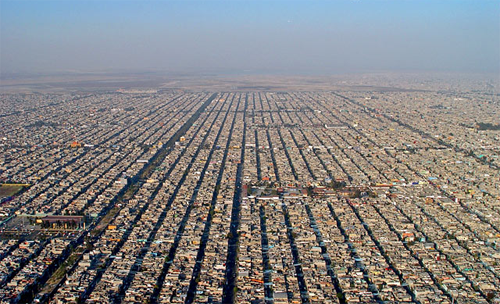In follow up to last week's lecture on residential growth and sprawl in Sydney, an article by Brandon Donnelly titled 'The Death of Planning Expertise' reflecting similar concerns on the other side of the globe was an interesting find. Funnily enough, this North American-based article attributes the demise of good town planning to the rise of 'community participation' and an associated lost respect for experts in the built environment field. Donnelly asserts that as people have been empowered by an increasing network of information sharing, they begin to devalue the expert knowledge of architects. It's a 'power to the people' type attitude that views the architectural opinion as pretentious.
The author illustrates his viewpoint with the below image, however no information on the location or what we're actually seeing here is provided. This could be slums from what we can tell from this image.

Source: Donnelly, B 2014, 'The Death of Planning Expertise', Sustainable Cities Collective, 19 June 2014, accessed 16 March 2016, <http://www.sustainablecitiescollective.com/donnellyb/259921/death-planning-expertise?utm_source=&utm_medium=&utm_campaign=>.
Although there are certainly valid opinions being expressed in this article which is supported by my last entry, I can't entirely agree with the idea. Poor urban planning is entirely an outcome of a government's (or multiple governments') failure to deliver appropriate policy. If the argument is in fact of the architectural scale, which may be likely as Donnelly generally points to architects as our experts rather than town planners in this article, there is evidence to both support and refute the claims made here.
Firstly, it is undeniable that a lack of expert consultation in residential development is certainly a barrier for sustainable outcomes. The proportion of houses designed by architects to project homes being built is now astronomical. Despite the recent increasing sustainability concerns of these big developers, there is a gap in design knowledge still apparent. On a recent visit to Fairwater Community at Blacktown, a new master-planned community development by Frasers, I observed homes equipped with rainwater tanks and air-conditioning systems powered by geothermal technology. Unfortunately, the brick-veneer construction of these homes and the 3mm sheets of glass and their entirely glazed back walls didn't support the energy-efficiency gains of their high-tech thermal control systems. However, this considered, are the so-called professionals actually doing a better job?
Having been working in the building industry for two years now, I have witnessed both positive and negative answers to this question. Whilst my most recent job was under a highly-experienced architect who valued design integrity and delivered architecture which reflected as such, there was often strong back-lash from the client and project manager who thought they knew better. On the other hand, in my first job I witnessed the architect design absolute monstrosities of glass and concrete for wealthy clients, without any consideration for sustainable design with a view only to satisfy the client's demands.
Both urban planning and good sustainable design are dwindling in our cities right around the world. But is it due to the empowerment of lay people and decreasing respect for our built environment professionals or because of an increasingly money-driven focus in our development system?
No comments:
Post a Comment